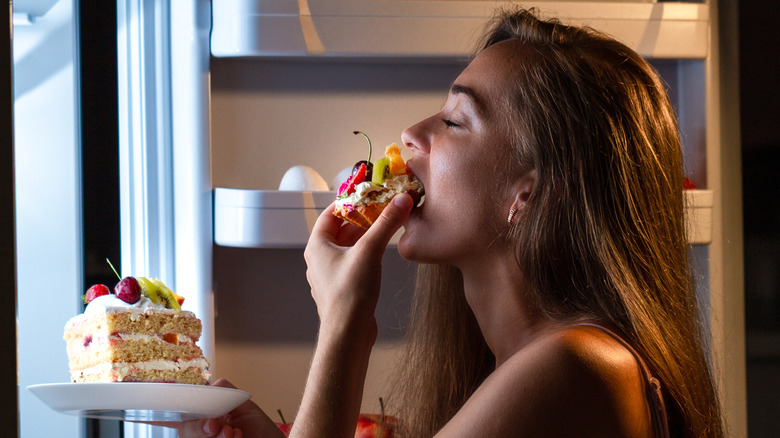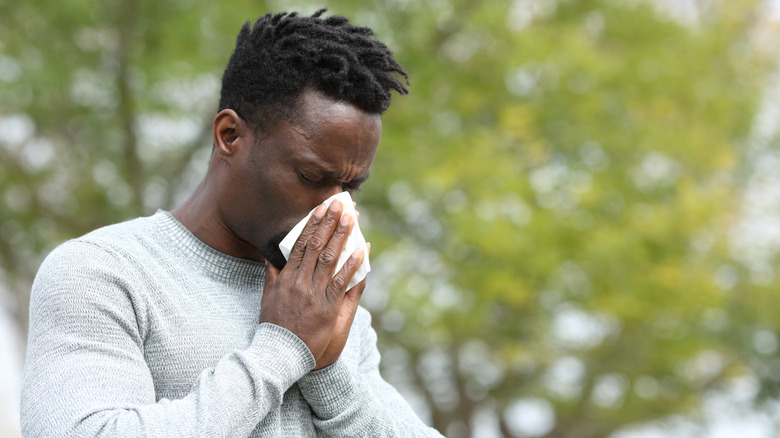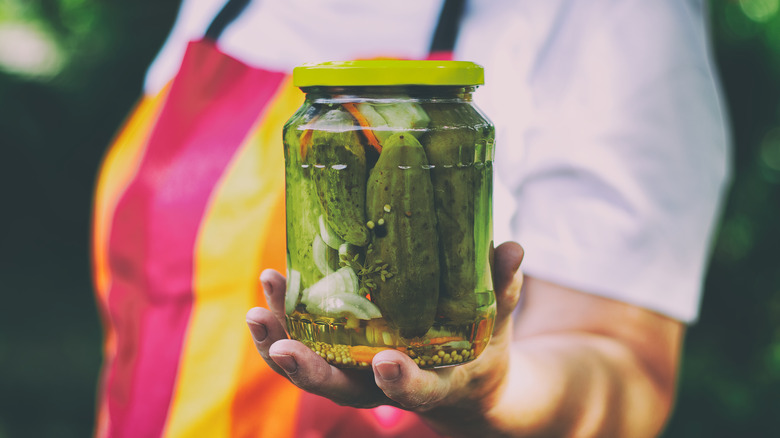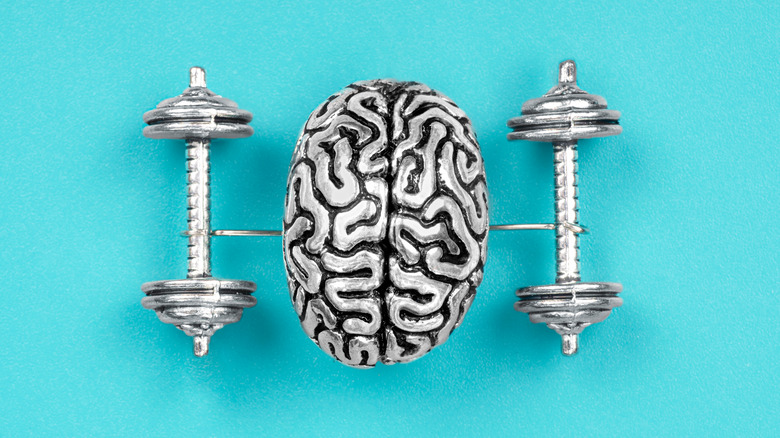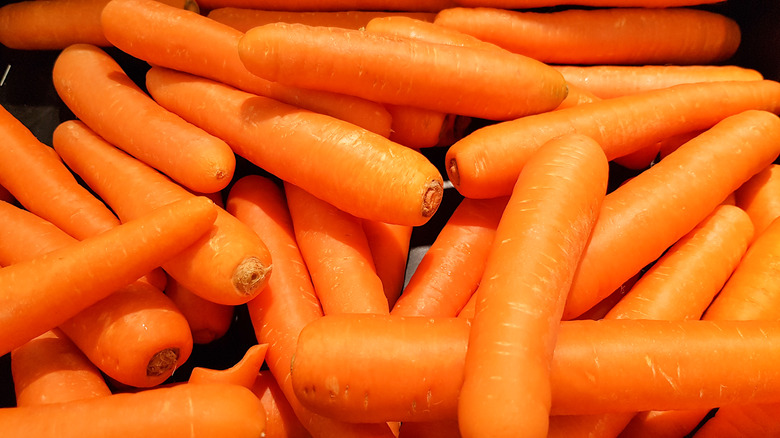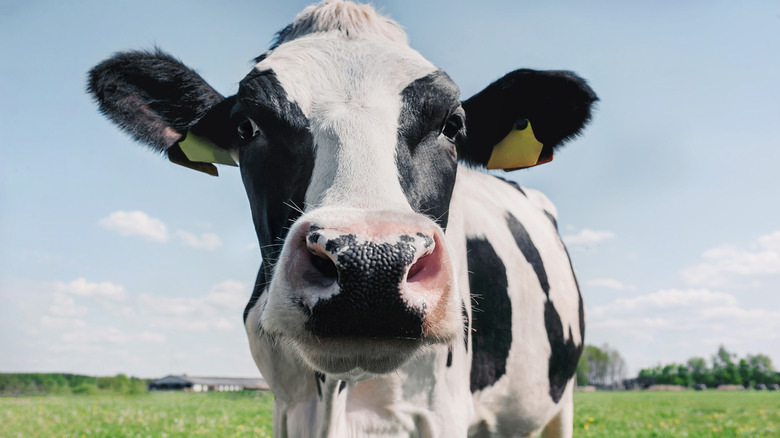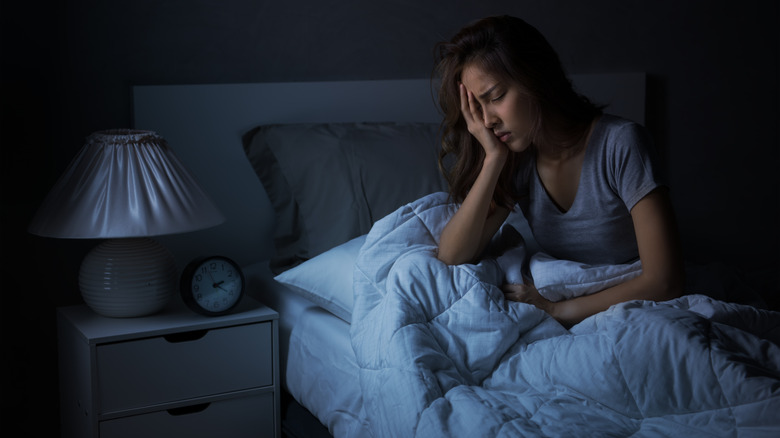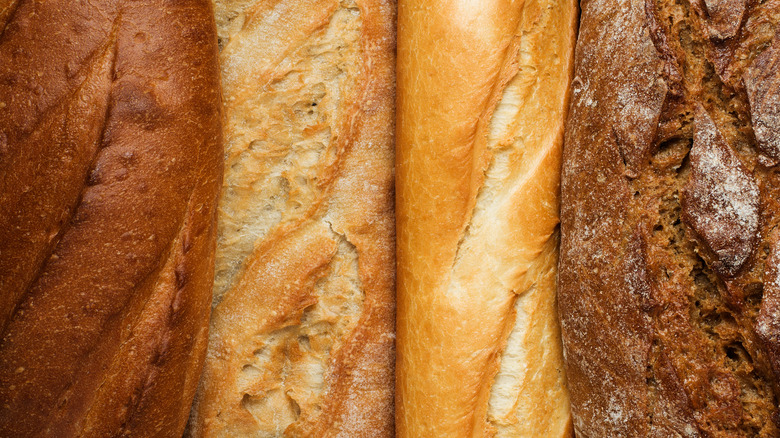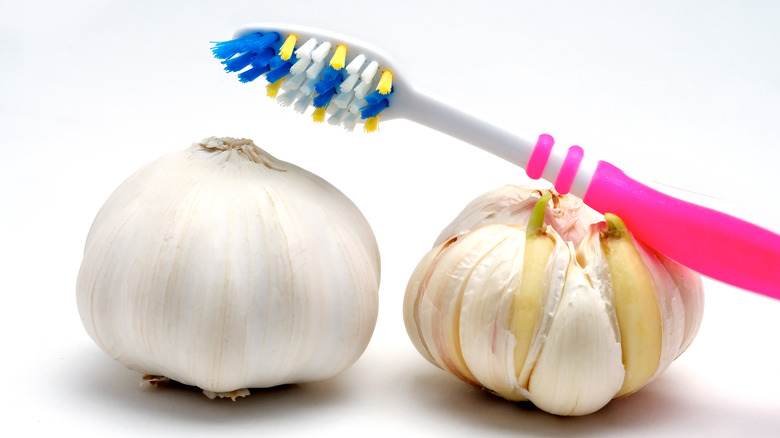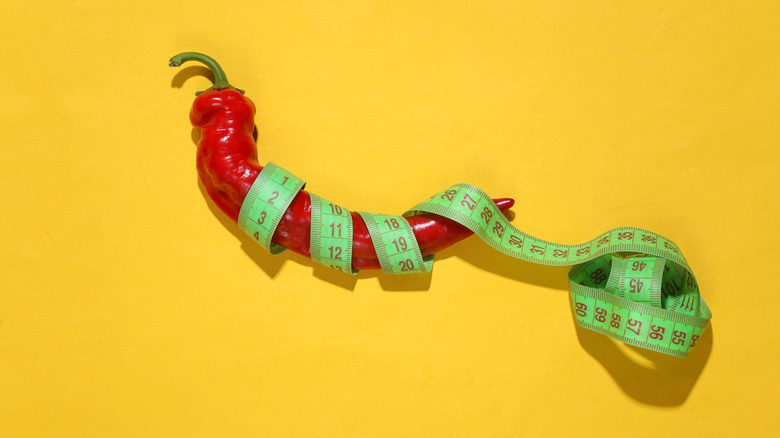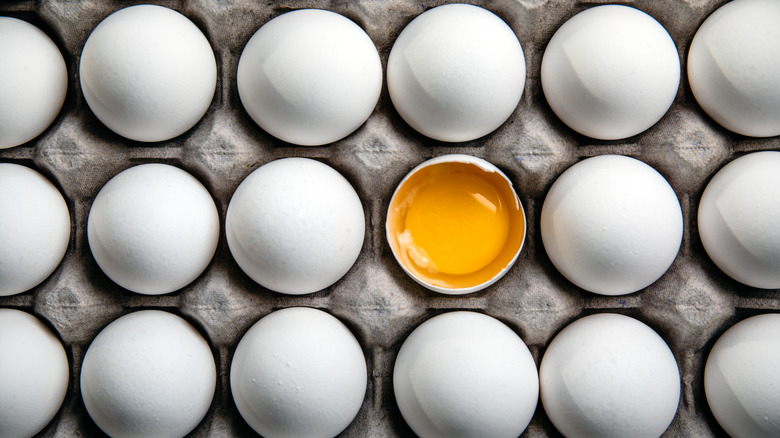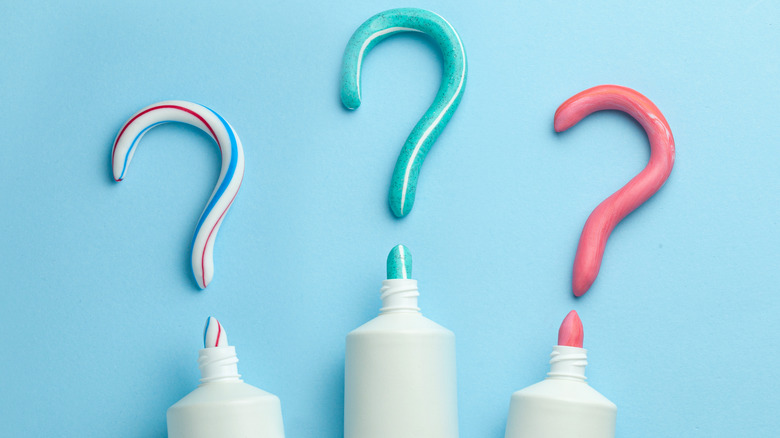Common Health Myths That Are Actually True
We've all heard the common health idiom "an apple a day keeps the doctor away." It's a fun little rhyme that most of us think of as more symbolic than literal. Maybe the apple is just standing in for all fruit. After all, "a honeydew melon a day keeps the doctor away" has too many syllables (and would be a lot to eat). Or the apple could just represent a well-balanced, healthy diet, right?
Maybe, but don't sell the apple short. As Healthline explained, eating this little fruit has been shown to reduce your chances of developing heart disease, cancer, diabetes, asthma, and bone issues, as well as high cholesterol and blood pressure. Plus, it can help you maintain a healthy weight, make you less likely to have a stroke, and keep your brain sharp. And let's not forget that apples are packed with vitamin C along with other vitamins and nutrients, including antioxidants, minerals, and fiber.
So, is an apple a day actually enough to keep the doctor away? No, but that doesn't mean the saying doesn't have some truth to it. Making apples a regular part of your diet can help you avoid certain health issues that require medical attention. Like a number of so-called health myths, the "apple a day" one has some basis in reality. Let's take a look at some of the most prevalent health tales that are actually true.
Eating late at night can lead to weight gain
Here's a perfect example of a health myth that on the surface seems to be logical. If you burn calories from food through exercise, wouldn't eating something right before bed be a bad idea? After all, you're going to be sleeping (or at least resting) not running or cycling. Well, there are actually two truths behind this myth, but the first one is a bit of a downer.
Unfortunately, the U.S. Department of Agriculture's Weight Control Information Network squashes the idea that not eating before bed is a way to avoid gaining weight (via WebMD). While they support that exercise is important to manage your weight, it doesn't matter if you eat (for example) a slice of chocolate cake early in the morning or late at night. In the end, you've consumed the calories from that cake within a certain 24-hour period. In other words, eating at any time of the day, including late at night, can lead to weight gain depending on your diet and whether or not you have an active or a sedentary lifestyle.
With that said, there is a certain wisdom to avoiding late-night snacking. As WebMD notes, people who eat after dinner tend to pick high-calorie junk food that they mindlessly gobble while watching TV or enjoying some screen time. This is because often nighttime munching is more about destressing after a long day or feeling bored than actually being hungry.
Not wearing a jacket makes you more likely to get a cold
"Bundle up, or you'll catch your death out there!" Be honest, you groaned a little when you read that. We've all been told to wear jackets, coats, hats, scarves, et cetera because somehow the temperature dropping is going to give us a cold or worse. Of course, there's more to this health myth than that.
As The Conversation pointed out, it's viruses that cause health problems like a cold or the flu. However, there is evidence that being out in the cold without properly bundling up can impair your immune system. While low temperatures are not the source of catching a cold, they can increase the chances of one of those pesky little germs getting through your body's natural defenses. Plus, if your nasal passages are cooler than normal, a virus will have an easier time surviving. And remember, viruses replicate — so even one can be a problem.
If you want to stay well during cold and flu season, bundling up is important, but so are common hygienic and healthy practices like frequent hand washing, getting enough sleep, and eating foods that support your overall good health (via The Conversation). In addition, managing stress is important to keep your immune system strong so don't hesitate to schedule some "me time" to unwind. Even a few minutes of something you find fun can make a big difference.
Sitting too close to the TV can hurt your eyes
It's hard to imagine there was a time when not only didn't smartphones and tablets exist, but TVs were in black and white. With the invention of the color television set, however, came the origin of this health myth. As Scientific American explained, General Electric (GE) began selling a type of color TV that gave off radiation that was as high as 100,000 times the then considered safe amount. And even though the sets were recalled, it's no wonder sitting too close to the TV had been dubbed unhealthy.
With that said, that doesn't mean binging on a favorite show can't cause eye problems. As Dr. Lee Duffner of the American Academy of Ophthalmology told Scientific American, you can get eye strain, as well as fatigue, depending on how long you watch TV, how close you are to the TV, and if you're on an angle from the TV. But don't worry. These are only temporary issues that go away once you give your eyes a rest.
Overwatching television can have other negative impacts on your health. According to the Nemours Foundation, indulging in four or more hours of TV viewing per day can lead to weight issues in children (via Scientific American). Bottom line: Limiting TV watching in favor of healthier activities like exercising outside and getting enough rest is the overall better way to stay healthy.
Ragweed allergies fade after the first frost
For many, spring is when the cold winter gives way to beautiful flowers. Then there are the allergy sufferers. Of course, it would be great to jump on the "we love spring" bandwagon, but all those colorful blossoms are loaded with pollen that seem to linger for months and months. Oh well, at least the first frost will bring some relief, right?
Well, as WebMD explained, different times of the year usually trigger different allergies. So, yes, it's true that spring tends to be all about pollen — specifically tree pollen. If you're allergic to grass pollen or ragweed, you most likely won't have a problem until the summer (depending on where you live). And if you're allergic to all three types of pollen, then that's probably why your spring allergies seem to linger until almost the fall.
However, there is some good news. If you do have a ragweed allergy, the first frost usually stops those irritating plants from causing you any more problems (via WebMD). However, the fall sometimes brings mold spores, which is a whole other type of allergy. And don't forget, you're likely to spend more time indoors during the winter, which means more exposure to dust mites, dander from pets, and other common indoor allergens. In short, the first frost can help you with your allergies depending on the type of allergies you have. Determining what exactly you're allergic to is crucial.
Pickle juice helps muscle cramps
Yes, you read that correctly. Not eating pickles but drinking their juice is supposed to be the all-natural equivalent of rubbing sports cream into a sore muscle. And this health "myth" is doubly strange because there's evidence that it actually works — although it's still not clear why it works.
As Healthline explained, research into the pickle juice phenomena is not exactly plentiful. One theory that WebMD debunked is that the briny liquid stops cramping because it helps to restore the body's electrolytes. Another possible explanation was pickle juice was so widely touted as a cramp cure-all that it had a placebo effect on many athletes (via Healthline). Evidence from a 2010 study, however, found mind over matter was not the juice's ultimate superpower.
While there still isn't a clear-cut reason for the power of pickle juice when it comes to cramps, Healthline pointed out a plausible theory: Basically, when the vinegar in the pickle juice hits the back of your throat, it causes a reflex reaction in your muscles that stops your cramps. Whatever the reason, if you can stomach a shot of it, this seemingly wild health myth might be a good way to recover after a workout. However, different types of pickles can have different ingredients in their juices, so it's important to check nutrition labels. Otherwise, you could be downing something that you're allergic to or that will make you sick.
Exercise makes you smarter
We've all seen the movies or TV shows where the empty-headed jock picks on the scrawny nerd. It's basically an entertainment cliché. However, you may have also heard that exercise can make you smarter. So, which is it? Well, it's true that brains and brawns are not mutually exclusive. In fact, all those hours at the gym can be just as beneficial for your mind as it is for your muscles.
Dr. John Ratey, who wrote "Spark – The Revolutionary New Science of Exercise and the Brain" explained that there's a cumulative effect on your brain when you work out (via Forbes). In fact, he said, your focus is sharper for a full two to three hours after you, for example, turn off that treadmill or stop swimming laps in the pool. Plus, exercise can help improve memory and concentration, and may even decrease your chances of developing Alzheimer's disease.
Besides your cognitive abilities, exercise may also impact the size of your brain (via Verywell Mind). Research has found that working out can keep your brain from getting smaller as you get older. An additional study involving mice found physical activity and the production of brain cells may go hand in hand (which may or may not explain why a certain lab mouse bent on world domination has such a large head). While exercise is good for the mind, that doesn't mean it should replace brain-stimulating activities like reading, crossword puzzles, or sudoku.
Carrots are good for your eyes but can turn your skin orange
Yes, Bugs Bunny's favorite food is at the center of two health myths. But that "wascally wabbit" may want to reconsider chomping into carrot after carrot, especially if he thinks these root vegetables have certain nutritional benefits.
As Scientific American explained, carrots contain a compound called beta-carotene that helps your body produce vitamin A. This nutrient is essential for good night vision and your eyes' health in general. In fact, without vitamin A, the part of your eye that protects your pupil and iris (aka your cornea) would cease to exist. So, does that mean you should load up on carrots? Well, it's not that simple. You see, high amounts of vitamin A can be dangerous, so your body naturally puts the breaks on how much it produces no matter how much beta-carotene you consume. And gorging on carrots has a very real downside.
Dermatologist Melissa Piliang warned that taking in too much beta-carotene can lead to a condition called carotenemia in which your skin turns "an orangey color" (via Cleveland Clinic). Fortunately, according to Dr. Piliang, you would need to eat 10 carrots every day for several weeks to develop carotenemia. Plus, the condition is harmless and reverses within a few months if you cut down on foods that contain beta-carotene.
Cow's milk is good for you
Dairy products have been both praised and criticized over the years. With slogans like "Milk. It does a body good" and even the playful "Got Milk?" ads, there's been definite attempts to market cow's milk as something healthy. Setting aside dairy alternatives like soy, oat, and even hemp, how does that classic milk your grandparents enjoyed hold up nutrition-wise?
Well, cow's milk may actually help you live a long life. The Prospective Urban Renewal Study surveyed more than 130,000 people from 21 countries and found that those who ate more dairy products were less likely to have a stroke, as well as develop other health problems (via ABC News). "Our findings support that consumption of dairy products might be beneficial for mortality and cardiovascular disease," said Mahshid Dehghan, one of the lead authors of the study.
Although this study's findings look promising for dairy, two doctors who were quoted in The Lancet (the same journal that published the study) cautioned that this research "is not the ultimate seal of approval for recommending whole-fat dairy over its low-fat or skimmed counterparts" (via ABC News). Case in point, the study focused on the health impact of yogurt and milk, not butter or cheese. So before you either add or remove dairy from your diet, you should speak with your health care professional about what is best for your health and your health concerns.
Eating before going to bed can lead to nightmares
Imagine this scene: A person eats a Dagwood sandwich loaded with foods like deviled eggs, spicy chicken, and garlicky pickles, and then immediately goes to bed. What do you think would happen next? If you said all that heavy, spicy food will give them nightmares, you're not alone. But how much of the "food equals bad dreams" scenario is based in fact?
Dr. Tore Nielsen, the director of the Dream and Nightmare Laboratory at Sacré-Coeur (Sacred Heart) Hospital, helped conduct research into food's impact on dreams (via Healthline). The study involved undergraduate students who reported foods that contained dairy, meat, starch, spice, and/or sugar gave them "disturbing" or "bizarre" dreams. However, Dr. Nielsen explained that lactose intolerance, for example, could explain why dairy impacted some of the students' dreams. Food allergies and digestive problems triggered by certain combinations of foods could also be the culprit behind the undergrads' dreams. Even the foods' nutrients could have affected how well they slept, and that alone may have affected their dreams.
In addition, Dr. Nielsen said the study's results could be because of stress or the power of suggestion (via Healthline). For example, if someone believes sugar causes bad dreams and eats what they think is a sugar-filled candy bar, they will have a nightmare even if what they really ate was sugar-free candy. So, yes, foods can give you bad dreams, but what foods (if any) vary from person to person.
Bread crusts are the most nutritious part of bread
Many children at one point or another don't want the crusts on their sandwiches. It might seem a little finicky, but it's usually just a phase and, besides, it's only a small part of the bread. They can't be missing out on that many nutrients, right?
Sorry to tell you this, but not eating the crust might mean one less defense against cancer (via ScienceDaily). The American Chemical Society's research on sourdough found that not only are those often discarded crusts loaded with antioxidants, but specifically have a high amount of a cancer-preventing one called pronyl-lysine. Keep in mind that this same antioxidant was not in the bread's flour but was actually created when the outside of the bread browned in the oven.
So if the crusts of bread have more of certain nutrients than the rest of the loaf, are certain breads' crusts better than others? Well, on the one hand, darker loaves like pumpernickel have more antioxidants like pronyl-lysine than, for example, white bread (via ScienceDaily). On the other hand, overbaked bread tends to be lower in antioxidants. So don't make the mistake of leaving bread in the oven longer, thinking the browner its crusts, the more nutrients it'll be guaranteed to have.
Garlic can relieve toothaches
Dracula is definitely not going to like this health myth. After all, garlic is his kryptonite, and yet he needs his teeth (or at least his two fangs) in proper working order just to get a bite to eat. Vampire puns aside, however, this popular herb is not infallible when it comes to fighting toothaches.
As Medical News Today noted, pain in your teeth can happen for many reasons, including food particles getting caught in your gums, an adult tooth pushing out a baby tooth, and even issues with your sinuses. However, garlic has natural antibacterial qualities, and bacteria is what causes cavities. So putting a little garlic next to a sore tooth may help kill off bacteria, slow your tooth's decay, and give you some pain relief.
Before you try this method, keep in mind that garlic has a very strong taste especially when it's uncooked (via Medical News Today). Also, you don't have to be a vampire to be allergic or severely intolerant to this pungent herb. If you are experiencing tooth pain, the best thing you can do is get yourself to a dentist as soon as possible. And keeping up with regular dental checkups is a good proactive way to stop toothaches before they start.
Spicy foods assist weight loss
This "myth" sounds too good to be true especially if you're a fan of spicy food. But as Men's Health pointed out (and pretty much every episode of "Hot Ones" backs up), the more heat a pepper or sauce packs, the more you're going to sweat just like at the gym or a sauna. Still, it can't be this easy to lose weight — but that doesn't mean there isn't a little crumb of truth to this myth.
According to Men's Health, foods like spicy peppers have capsaicin, and evidence supports that this potent compound can help rev up your metabolism. But there's a couple of catches. First, the research in question focused more on capsaicin as a supplement not as a food ingredient. And second, that metabolic jump start was enough to burn off one mouthful of pizza. In fact, physician Spencer Nadolsky said "Capsaicin isn't a therapy I recommend to my patients for weight loss. There may indeed be an effect, but it is too small to justify spending time and money and worrying about taking another pill."
To be fair, there are reports that capsaicin can help manage your insulin (via Men's Health). So, if you're still considering taking capsaicin as a supplement, keep in mind that it can lead to stomach ulcers, as well as burning, cramps, and irritation, when taken in excess.
Eggs contain a lot of cholesterol
This health myth is a bit tricky. Do chicken eggs have cholesterol? Yes, in fact, they have quite a bit (via Mayo Clinic). But do they raise your cholesterol? Not that much when compared to other cholesterol-loaded foods. And, unfortunately, research into this topic is pretty contradictory.
According to the Mayo Clinic, there are findings that eggs are bad for your heart, and yet it also could be more about how you prepare your eggs than the actual eggs themselves. For example, scrambled eggs loaded with butter and served with a side of bacon are going to be less healthy than a soft-boiled egg served with cantaloupe. Some research warns that eggs can cause diabetes while others found nothing to support that conclusion. And still more research suggests that eggs are good for your eyes and can help you avoid having a stroke.
So, are eggs healthy or unhealthy? Well, as the Mayo Clinic notes, you should not consume more than 300 milligrams of dietary cholesterol per day. And unfortunately, an egg can have as much as 186 milligrams. Of course, egg whites are a protein-packed option since all the cholesterol found in eggs is concentrated in the yolk. However, you should speak with your health care professional before making big changes to your diet.
This toothpaste hack wasn't always a myth
This so-called myth seems like a useful life hack. After all, you need toothpaste for your oral health. And a tiny dab or two to knock out those annoying zits isn't going to break the bank. But does it really work or is this a case of DIY hype?
The truth is modern toothpaste no longer has a key ingredient that was essential for this fast complexion fix (via Healthline). The U.S. Food and Drug Administration has banned a chemical called triclosan that was once used in toothpaste. Although triclosan had an antibacterial quality (which is what made it so effective at zapping zits), research has found it can be bad for your thyroid.
Okay, but what about the ingredients that are still in toothpaste-like hydrogen peroxide and baking soda? Couldn't those at least lessen the appearance of zits? Possibly, but board-certified dermatologist Dr. Tsippora Shainhouse warned that, "Toothpaste has a basic pH [level] ... and can irritate healthy skin, which has a naturally acidic pH." In other words, you could end up with more than just acne, including a rash. In addition, Healthline pointed out that some kinds of toothpaste contain sodium lauryl sulfate, which, again, may be too strong for your skin. In fact, irritating your skin can actually give you more breakouts rather than help get them under control. But don't worry, even if your zits have left their mark, there are ways to get rid of acne scars.


